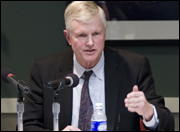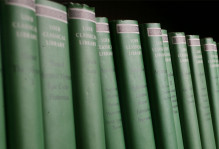W. Lee Rawls, an appreciation
This past week, the College of William and Mary lost a great friend and mentor, Lee Rawls.
Lee was a career-long participant in the policy making process in Washington, D.C. Fresh out of the Navy in the early 1970s, he first went to work for the Environmental Protection Agency, and then quickly moved to the staff of the Senate Committee on Environment and Public Works. For the next four decades, he held a wide variety of positions in the legislative and executive branches, and made periodic forays with law firms and advocacy organizations. But mostly he was a public servant. Over the years, he served as Chief of Staff to Senator Pete Domenici, Assistant Attorney General for the Office of Legislative Affairs at the U.S. Dept. of Justice, Chief of Staff to Senator Bill Frist, Chief of Staff to the Senate Majority Leader, and Chief of Staff and then Senior Counsel to the Director of the FBI.
This impressive resume, however, only hints at what made Lee Rawls special. Lee had strong political views, enjoyed a good fight, and was remarkably free of pettiness. As a young staffer on Environment and Public Works, he learned about legislative strategy and what can be achieved through the lawmaking process by working for and observing some of the best and most constructive politicians in the business – Howard Baker, Pete Domenici, the list goes on.
There’s been a lot of loose talk of late about the evils of partisanship, self-interested politicians, and a broken Congress. Lee recognized this kind of talk as bunk.
He understood that in a large diverse nation made up of flesh and blood human beings, self-interested behavior, partisanship, and political conflict are not just unavoidable – they are a healthy and critical feature of the political process. The real contribution of the politician, he often said, is not in downplaying this conflict, or, even worse, in ignoring the din and simply implementing their own personal visions of the public good, whatever the heck that is. Instead, politics can be a noble profession in which leaders and their aides forge the kinds of messy compromises necessary to hold together a free society.
I’ve never met anyone who had a clearer understanding of the stakes and practical logistics of governing than Lee Rawls. For decades he was one of the most respected and well-liked political hands on both sides of the partisan aisle. He was the kind of person that embattled members of Congress and agency officials would appoint to a senior staff position when they needed a grownup in the room.
In his spare time, over the past two decades he also served as a highly valued teacher and mentor to over 400 W&M students. In the early 1990s, Lee mentioned to a common acquaintance of ours that he was interested in doing some part-time college teaching, and that he preferred a venue outside of Washington. This fellow told Lee that he knew a W&M professor on leave working for the Congress. That was me. The three of us had lunch and it was obvious from the get-go that Lee would be a remarkable classroom teacher. Indeed, you would have to be a complete idiot not to see the possibilities. So, for the next 18 years through the fall of 2010, Lee traveled down to Williamsburg six or seven times each semester, teaching a one-credit seminar that usually enrolled about 15 students.
The seminar was called, “Congress, The Executive, and Public Policy,” but it was basically an introduction to Lee Rawls and his take on legislative strategy and the nature of politics. The content was a lot more than war stories and anecdotes. Although he played this down, Lee was a brilliant analyst, as you might expect from someone from the gene pool that also produced his uncle, the path breaking Harvard philosopher, John Rawls. Lee was widely read in American history, the best recent scholarship about Congress, evolutionary psychology, and even a little game theory. The richness and originality of his thinking about politics is apparent in his recent book, In Praise of Deadlock: How Partisan Struggle Makes Better Laws, which he wrote during a four-month stint as a public policy scholar at the Woodrow Wilson Center.
The impact that Lee Rawls had on almost a generation of W&M students was profound and reflected in the many messages I received from them after his death last Sunday. “We lost a great member of the W&M community yesterday,” one student wrote. “He loved teaching here, and we were honored to have him.” Other comments included: “Mr. Rawls’ class was such a great way to make sense of the health care wrangling that was to come, and I am eternally grateful to him for that;” “Lee Rawls was an amazing professor;” and “I will never forget my experience in Lee’s course.”
Above and beyond his decades of practical experience and deep understanding of the strengths and weaknesses of the relevant scholarship, you see, what made Lee so effective with our students was the zest and joy with which he taught and wrote about American politics. Professionally, he had nothing to gain from teaching undergraduates or taking half a year off to write a book. The money that W&M paid him to teach his seminar was trivial, not even covering the travel and lodging expenses that he incurred year after year to make the class possible.
He enjoyed bringing to Williamsburg close friends like Steve Bell and Bill Hoagland, both former Domenici aides and two of the most knowledgeable people about the federal budget, to participate in simulation exercises with the students in his class. Believe me, walking by the seminar room during those sessions … the enthusiasm and humor that accompanied the students’ attempts to sell Bell, Hoagland and other guests on their proposals for budget reform and other policies was palpable and infectious. Outside of class, Lee regularly counseled students about professional opportunities. He helped place dozens of them in internships and jobs after graduation.
For Lee’s family, of course, his death is devastating and they are in our thoughts and prayers. For me, many W&M students, and other people who benefited from his wise counsel, well, we know that we will never have a better friend.
Comments are currently closed. Comments are closed on all posts older than one year, and for those in our archive.





Thank you for taking the time to write such a nice article. I grew up with his daughter so I know his wonderful father figure side. Lee was an amazing person who touched many people on many different levels.
Thank you for the wonderful thoughts of Lee that you have shared.
As someone who worked for Lee I can affirm that he was a legislative master. A big part of it was that he loved the process.
Lee always treated everyone with respect and a sense of civility that is all too often absent on Capitol Hill. He understood the difference between disagreeing and being disagreeable.
He was above all, a kind and decent man who never forgot his friends. In the days since his death, I have heard from so many people who have echoed these reflections. We will all deeply miss picking up the phone to hear that familiar voice and refrain–“just checking in”.
Thank you again.
Kevin Holsclaw
Thanks for a wonderful words.
Lee Rawls was a great influence on the lives of whosoever he met and his legacy shall endure.
Thank you, Lee, for the brief time you shared with us.
Lee has been a valued friend for some time now, dating back to the Stennis Center’s Congressional Fellowship program and carrying forward with many appearances here at the Wilson Center on our Congress Project seminar panels. We got to know each other especially well while Lee was here a couple of years ago as a public policy scholar to write his book, “In Praise of Deadlock.” His insights into the politics and processes of Congress were always on the mark, but his gentle humor helped bring so many things home to his listners. He left us too soon, but we’ll always cherish our memories of his smiling, low-keyed presence–a true gentleman, scholar and friend.
I just found out about this online while looking for the Army War College address to send him a letter. I am in shock.
I want people to know: I didn’t know him from Adam when I took his class at W&M in 1996. We liked each other and became friends. Lee got me my first job during law school. He was always supportive and shared his wisdom on life, love and work. We talked on the phone last August about our typical topics; I always felt invigorated after our conversations because he was so full of life, serious and yet super funny.
I am really sick about this. He was just a uniquely great guy.
Lee was two years behind me at Princeton, where we were both on the tennis team. I remembered him as a likeable, gentle giant.